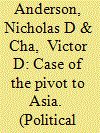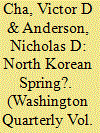|
|
|
Sort Order |
|
|
|
Items / Page
|
|
|
|
|
|
|
| Srl | Item |
| 1 |
ID:
157283


|
|
|
|
|
| Summary/Abstract |
How should the United States approach the Korean Peninsula and the problem of North Korean nuclear proliferation? Since its initial test in October 2006, North Korea has conducted five more, increasing the estimated yield with each one.1
1. “The Missiles of North Korea,” CSIS Missile Defense Project (2017), https://missilethreat.csis.org/country/dprk/ (accessed October 20, 2017).
View all notes
Pyongyang's September 2017 nuclear test—which they claimed was a thermonuclear device—had an estimated yield of between 50–280 kilotons, a significant increase from previous tests.2
2. Michelle Ye Hee Lee, “North Korea's Nuclear Test May Have Been Twice as Strong as First Through,” The Washington Post, September 13, 2017, https://www.washingtonpost.com/world/north-korea-nuclear-test-maybe-have-been-twice-as-strong-as-first-thought/2017/09/13/19b026d8-985b-11e7-a527-3573bd073e02_story.html (accessed October 20, 2017).
View all notes
Perhaps more alarming to U.S. policymakers, the North has surged forward with its missile program, conducting 15 missile tests in 2015, 24 in 2016, and thus far 19 missile tests in the first 10 months of 2017.
|
|
|
|
|
|
|
|
|
|
|
|
|
|
|
|
| 2 |
ID:
155470


|
|
|
|
|
| Summary/Abstract |
What explains Japan’s security behavior? As an economically powerful state without commensurate military capabilities, Japan has long puzzled theorists of international relations. To explain this puzzle, many scholars have put forth arguments focusing on Japanese domestic institutions and anti-militarist ideas. In contrast, I argue that Japan’s security ‘production’ is primarily driven by two key variables: the regional threat environment and the strength of security commitment from its ally and great power patron, the United States. These two factors vary and interact in ways that determine Japan’s level of security, which drives its security policy. These arguments are illustrated through a longitudinal analysis of Japan’s security behavior, comprised four temporal ‘cases’ running from 1960 to the present day.
|
|
|
|
|
|
|
|
|
|
|
|
|
|
|
|
| 3 |
ID:
157695


|
|
|
|
|
| Summary/Abstract |
NICHOLAS D. ANDERSON and VICTOR D. CHA discuss the origins of the pivot to Asia, the Obama administration’s strategy in the Asia-Pacific. They argue that the pivot was neither a failure, as its critics suggest, nor a success, as its supporters claim. For the authors the pivot was a midcourse adjustment to a weak and flawed early Obama Asia policy.
|
|
|
|
|
|
|
|
|
|
|
|
|
|
|
|
| 4 |
ID:
155438


|
|
|
|
|
| Summary/Abstract |
The USA has long called for the complete, verifiable and irreversible denuclearisation of North Korea. But is this a realistic policy option? In order to address this question, a broader question needs to be answered: What are the primary drivers of North Korea’s interest in nuclear weapons? Most answers to this question take one of two basic positions. ‘Doves’, on the one hand, see North Korea developing nuclear weapons because of the threatening foreign policies of the USA and South Korea. ‘Hawks’, on the other hand, see North Korean nuclear development as driven by factors internal to the North Korean regime, inherent in its personality. The author examines these two arguments against the evidence and finds them both wanting. In contrast, he puts forth an alternative argument focused on the power of the global hegemon, the USA, and its position on the Korean Peninsula. This power and positional alternative is shown to be better reflected in the evidence presented.
|
|
|
|
|
|
|
|
|
|
|
|
|
|
|
|
| 5 |
ID:
112160


|
|
|
| 6 |
ID:
189084


|
|
|
|
|
| Summary/Abstract |
Why do great powers engage in territorial expansion? Much of the existing literature views expansion as a largely intentional activity directed by the leaders of powerful states. Yet nearly 25 percent of important historical instances of great power expansion are initiated by actors on the periphery of the state or empire without authorization from their superiors at the center. Periphery-driven “inadvertent expansion” is most likely to occur when leaders in the capital have limited control over their agents on the periphery. Through their actions, peripheral agents effectively constrain leaders from withdrawing from these newly captured territories because of sunk costs, domestic political pressure, and national honor. When leaders in the capital expect geopolitical consequences from regional or other great powers, such as economic sanctions, militarized crises, or war, they are far less likely to authorize the territorial claims. A mixed-methods research strategy combines new quantitative data on great power territorial expansion with three qualitative case studies of successful (and failed) inadvertent expansion by Russia, Japan, and France. Inadvertent expansion has not completely gone away, particularly among smaller states, where government authority can be weak, control over states’ apparatuses can be loose, and civil-military relations can be challenging.
|
|
|
|
|
|
|
|
|
|
|
|
|
|
|
|
|
|
|
|
|